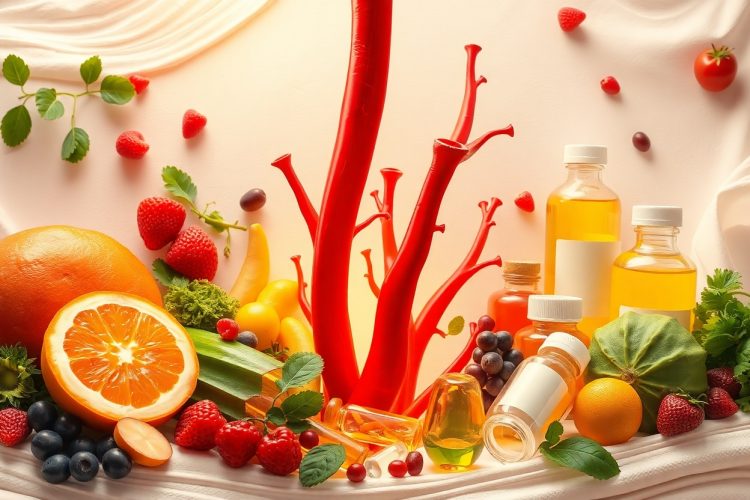
The health of your blood vessels directly influences your heart, brain, organs, and longevity. While supplements can help, whole foods provide powerful combinations of nutrients, fiber, and antioxidants that work synergistically to protect and strengthen the vascular system.
In this article, we’ll explore powerful, science-backed foods that support vascular health — what’s in them, how they work, and why they’re worth adding to your daily diet.
🥦 1. Broccoli
Key Nutrients: Sulforaphane, Vitamin C, Vitamin K, Fiber
Why it’s good:
Broccoli is rich in sulforaphane, a compound that activates antioxidant defenses and protects blood vessel linings from damage. It also provides Vitamin C to support collagen in vessel walls and Vitamin K to prevent calcium buildup in arteries.
How it helps:
- Reduces arterial stiffness
- Fights inflammation
- Prevents calcification of arteries
🍇 2. Blueberries
Key Nutrients: Anthocyanins, Polyphenols, Vitamin C
Why it’s good:
These small berries pack a punch of anthocyanins, powerful polyphenols that reduce inflammation and improve endothelial function. Daily consumption is linked to improved circulation and reduced blood pressure.
How it helps:
- Improves arterial elasticity
- Fights oxidative stress
- Enhances nitric oxide production (for vasodilation)
🐟 3. Fatty Fish (Salmon, Mackerel, Sardines)
Key Nutrients: Omega-3 Fatty Acids (EPA & DHA), Vitamin D, Selenium
Why it’s good:
Rich in Omega-3s, these fish help lower triglycerides, reduce blood clotting, and ease vessel inflammation. They also support heart rhythm and lower risk of heart disease.
How it helps:
- Reduces blood pressure
- Prevents plaque buildup
- Supports overall cardiovascular health
🍊 4. Citrus Fruits (Oranges, Grapefruits, Lemons)
Key Nutrients: Vitamin C, Hesperidin, Rutin, Flavonoids
Why it’s good:
Citrus fruits contain rutin and hesperidin, flavonoids that strengthen capillaries and improve blood flow. Vitamin C supports collagen and elastin production in blood vessels.
How it helps:
- Strengthens capillaries
- Improves blood vessel flexibility
- Protects against oxidative damage
🥬 5. Leafy Greens (Spinach, Kale, Arugula)
Key Nutrients: Nitrates, Magnesium, Vitamin K1, Folate
Why it’s good:
Leafy greens are natural sources of nitrates, which convert to nitric oxide in the body — a molecule that helps blood vessels dilate and improves flow.
How it helps:
- Lowers blood pressure
- Enhances circulation
- Supports detox and vessel relaxation
🧅 6. Onions & Garlic
Key Nutrients: Quercetin, Allicin, Sulfur Compounds
Why it’s good:
Onions are rich in quercetin, a flavonoid that reduces inflammation and improves blood vessel function. Garlic contains allicin, which helps lower blood pressure and cholesterol.
How it helps:
- Supports nitric oxide production
- Reduces arterial plaque
- Fights oxidative stress
🥜 7. Beans and Lentils
Key Nutrients: Magnesium, Potassium, Fiber, Plant Proteins
Why it’s good:
These legumes are loaded with soluble fiber that helps remove excess cholesterol and reduce arterial stiffness. They’re also rich in magnesium and potassium, both crucial for vascular tone.
How it helps:
- Stabilizes blood pressure
- Lowers LDL cholesterol
- Improves endothelial function
🍅 8. Tomatoes
Key Nutrients: Lycopene, Vitamin C, Potassium
Why it’s good:
Lycopene, a powerful antioxidant in tomatoes, protects the walls of blood vessels from oxidative damage and reduces LDL oxidation, a key step in plaque formation.
How it helps:
- Prevents artery hardening
- Improves lipid profiles
- Reduces vascular inflammation
🥑 9. Avocados
Key Nutrients: Monounsaturated Fats, Potassium, Vitamin E
Why it’s good:
Avocados are high in heart-healthy fats that help maintain flexible blood vessels. They also contain potassium and Vitamin E, both key to maintaining proper vascular tone and antioxidant protection.
How it helps:
- Supports endothelial function
- Prevents arterial stiffness
- Balances cholesterol levels
🌰 10. Walnuts & Almonds
Key Nutrients: Omega-3 (ALA), Vitamin E, L-Arginine, Magnesium
Why it’s good:
These nuts are packed with plant-based omega-3s, Vitamin E, and L-arginine, which promotes nitric oxide production. Regular consumption improves artery function and lowers bad cholesterol.
How it helps:
- Boosts blood flow
- Reduces LDL oxidation
- Enhances vessel flexibility
🏁 Additional Smart Habits
Eating the right foods is just one part of the equation. To fully protect your blood vessels, combine these dietary strategies with:
- 🚶♂️ Daily movement (brisk walking, cycling, swimming)
- 🧘 Stress reduction techniques (deep breathing, meditation)
- 💧 Proper hydration
- 😴 Quality sleep
Together, these habits and foods form the foundation of lifelong vascular health — keeping your heart, brain, and entire body strong and vital.